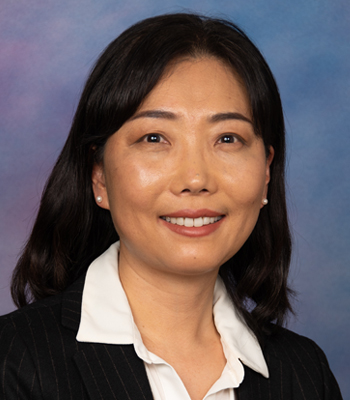HyeonJoo Cheon
Address
4100 John R St. Detroit, MI, 48201Office address
HWCRC Rm. 640.1
Department
Oncology
Research interests
The molecular mechanisms and the impact on cancer therapy of
• Cancer cell-produced type I-interferon/ Interferon addiction of cancer cells
• Cancer cell-intrinsic/ immune-independent function of PD-L1
• Combination therapy using radiation/ chemotherapy and anti-PD-L1
Research description
The Cheon Lab is interested in how cancer cells regulate their own synthesis of type-I interferon (IFN-I) and how they control their responses to IFN-I in the tumor microenvironment. Cancer cell-intrinsic IFN-I synthesis and response impact the effectiveness of radiation therapy, chemotherapy, and immunotherapy. IFN-I contributes to both cell death and survival depending on its strength and duration of stimulation. Acute responses to IFN-I are induced by therapeutic levels of intense DNA damage, leading to cell death through expression of cytotoxic IFN-stimulated genes (ISGs). On the other hand, chronic responses to low levels of IFN-I, induced by repeated exposures to low-level DNA damage, render cells more resistant to DNA damage by inducing pro-survival ISGs, the IFN-related DNA damage resistance signature (IRDS). Some cancer cells constitutively produce and are addicted to their own IFN-I (IFN addiction). They undergo spontaneous apoptosis when their IFN responses are blocked. Interestingly, programmed cell death ligand 1 (PD-L1), often expressed in cancer cells to avoid T cell attack, regulates both sides of IFN-I responses. High levels of PD-L1 inhibit acute cytotoxic IFN-I responses and sustain chronic pro-survival IFN-I responses, protecting cancer cells from DNA damage.
Our current research is focused on: i) determining effective therapeutic strategies that combine DNA damaging agents, IFN-I, and anti-PD-L1 antibodies, which can target cancer cell-intrinsic mechanisms, as well as immune-dependent mechanisms; and ii) elucidating the molecular and cellular mechanisms of how PD-L1 inhibits the JAK-STAT pathway in response to IFN-I, which induces cell killing, and iii) the mechanisms of how PD-L1 facilitates constitutive STING (stimulator of interferon genes) activation that leads to low levels of IFN-I synthesis in cancer cells, inducing chronic pro-survival responses. In the long run, our research will contribute to innovative approaches to treat therapy-resistant tumors using knowledge of IFN-I synthesis and signaling in cancer cells, which has not been previously understood because of the complexity of IFN biology.
Selected publications
Philips RL, Wang Y, Cheon H, Kanno Y, Gadina M, Sartorelli V, Horvath CM, Darnell JE Jr, Stark GR, O'Shea JJ. The JAK-STAT pathway at 30: Much learned, much more to do. Cell. 2022;185:3857-76.
Cheon H, Wang Y, Wightman SM, Jackson MW, Stark GR. How cancer cells make and respond to interferon-I. Trends Cancer. 2022;S2405-8033:00194-7.
Cheon H (first & corresponding author), Holvey-Bates EG, McGrail DJ, Stark GR. PD-L1 sustains chronic, cancer cell-intrinsic responses to type I interferon, enhancing resistance to DNA damage. PNAS 2021;118:e2112258118.
Kondratova A, Cheon H (co-first author), Dong B, Holvey-Bates EG, Jha BK, Taran I, Silverman RH, Stark GR. Suppressing PARylation by 2’,5’- Oligoadenylate synthetase 1 inhibits DNA damage-induced cell death. EMBO J 2020;39:e101573.
Doherty MR, Parvani JG, Tamagno I, Junk DJ, Bryson BL, Cheon H, Stark GR, Jackson MW. The opposing effects of interferon-beta and oncostatin-M as regulators of cancer stem cell plasticity in triple-negative breast cancer. Breast Cancer Research 2019;21:54.
Stark GR, Cheon H, Wang Y. Responses to Cytokines and Interferons that Depend upon JAKs and STATs. Cold Spring Harb Perspect Biol 2018;10:a028555.
Doherty MR, Cheon H, Junk DJ, Vinayak S, Varadan V, Telli ML, Ford JM, Stark GR, Jackson MW. Interferon-beta represses cancer stem cell properties in triple-negative breast cancer. PNAS 2017;114:13792.
Sung PS, Cheon H, Cho CH, Hong SH, Park do Y, Seo HI, Park SH, Yoon SK, Stark GR, Shin EC. Roles of unphosphorylated ISGF3 in HCV infection and interferon responsiveness. PNAS 2015;112:10443.
Wienerroither S, Shukla P, Farlik M, Majoros A, Stych B, Vogl C, Cheon H, Stark GR, Strobl B, Müller M, Decker T. Cooperative Transcriptional Activation of Antimicrobial Genes by STAT and NF-κB Pathways by Concerted Recruitment of the Mediator Complex. Cell Rep. 2015;12:300.
Cheon H (corresponding author), Borden E, Stark GR. Interferons and their stimulated genes in the tumor microenvironment. Semin Oncol 2014;41:156.
Cheon H, Holvey-Bates EG, Schoggins JW, Forster S, Hertzog P, Imanaka N, Rice CM, Jackson MW, Junk DJ, Stark GR. IFNβ-dependent increases in STAT1, STAT2, and IRF9 mediate resistance to viruses and DNA damage. EMBO J 2013;32:2751. *Recommended Article by Faculty 1000 Prime (https://facultyopinions.com/prime/718118369)
Wang Y, von Boxel-Dezire A, Cheon H, Yang J, Stark GR. STAT3 activation in response to IL-6 is prolonged by the binding of IL-6 receptor to EGFR. PNAS 2013;110:16975.
Education/training
B.S. 1993 Yonsei University, Seoul, South Korea
M.S. 1996 Yonsei University, Seoul, South Korea
Ph.D. 2004 Korea University, Seoul, South Korea
Postdoc 2009 Cleveland Clinic, Cleveland, OH
